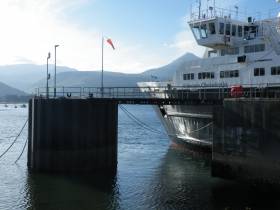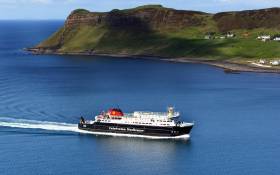Displaying items by tag: Transport Scotland
CalMac's New £900m Scottish West Coast Contract Begins
#CalMacContract - The £900m ferry contract to operate Scottish west coast services awarded to CalMac Ferries Ltd by Transport Scotland earlier this year, has been in force for almost a week.
The contract that began last Saturday, 1 October is valid for the next eight years which will see the extensive network of Western Isles and Clyde ferry operations remain in public hands.
Customers travelling by ferry from the first day of the contract will also see a new 'operator mark' which has been produced to show that Caledonian MacBrayne is operated by CalMac Ferries Ltd. It will not replace the familiar iconic lion rampant heraldic device on ships but will be rolled out across the network in a variety places including on uniforms, on ships, in ports and in printed material, as part of a tender requirement set by Transport Scotland.
CalMac Managing Director Martin Dorchester said: "The new operator mark may seem a small change but it is symbolic of the positive changes we are bringing to the new contract, and will be worn and displayed with pride by everyone at CalMac."
He said: "The start of this contract marks the culmination of almost two years of hard work to develop and submit our bid for the new contract, and everyone at CalMac, and the communities who rely on our ferry services, who provided input and support, can be very proud of their achievement."
"Since the announcement in May and the formal signing of the new contract at the end of August we have been doing the ground work to convert our winning proposals into improvements which will transform the onboard travel experience for our customers over the life of the contract.
These include:
• Providing the most up to date customer information available
• Providing a modern ticketing system.
• Improving accessibility for customers.
• Improving integration with other modes of transport
• Investing £6 million to refresh the appearance of vessels and ports (see redevelopment of terminal at Brodick, Isle of Arann)
He said: "Clearly some of these will take some time to work through, and the delay to signing the contract has also had an impact on progress, but some improvement are already well in hand, and our commitment to these is enshrined in the contract which is legally binding and will be closely managed by our client, Transport Scotland.
"After the years of uncertainty over our future I know everyone is looking forward to playing a part in this an exciting new chapter in the story of CalMac and these vitally important ferry services."
CalMac Unveils West Coast Ferry Plans for "New Era"
#NewEra - Scottish transport operator, CalMac has gone public for the first time with ambitious plans to transform west coast ferry services following formal granting of its new contract for the next eight years.
As reported on Afloat, CalMac was announced as the successful bidder for the Clyde and Hebrides Ferry Services (CHFS) tender in May, signed the contract with Transport Scotland on August 22 after finalisation of legal agreements. The contract begins on 1 October, 2016 and will run until 2024.
Scottish Ministers and Transport Scotland place great value on the contribution that the Clyde and Hebrides Service can make to the social, cultural and economic vitality of Scotland, and in particular in the Island and Coastal communities.
Managing Director, Martin Dorchester, said that CalMac's winning bid was rooted in ambitious plans to drive improvements which will transform the experience of ferry travellers, exemplify customer focus, and show the company's determination to make a positive difference to the communities.
The planned innovations, most of which will be put in place in the first two years of the contract, include:
-
Maximise opportunities for local companies, supported businesses (where 30% of staff are disabled or disadvantaged) and social enterprises, to tender for supply contracts. CalMac has set a target of sourcing 80% of fresh produce from within its network area.
-
Appoint a Director of Community and Stakeholder Engagement and create a Communities Board to involve communities in strategic matters that affect them.
-
An innovative approach to the introduction of smart and integrated ticketing offering multi-modal ticketing to provide improved choice and convenience for passengers.
-
Continued investment in Officer Cadets and rating apprenticeships and partnering with local maritime training organisations such as University of the Highlands and Islands and City of Glasgow College to further to develop our qualified and skilled workforce, and develop a strong maritime training economy.
-
Work in partnership with shipyards to plan and schedule long-term maintenance activities to minimise reactive maintenance, improving vessel reliability for customers.
-
Investing £6m in on-board and port and passenger area improvements including consistent signage, a standard look and feel to customer sitting and waiting areas, upgraded restaurant counters and retail outlets, piloting an 'at seat' drinks trolley service, and digital information screens, all aimed at improving customer accessibility and experience.
-
Daily demand forecasting combined with the introduction of variable terms and conditions to discourage late cancellations and no shows. This will lead to improved accessibility for customers, better capacity utilisation and greater certainty of travel.
-
Appoint a Transport Integration Manager to work with other providers on timetable planning, disruption management, and the displaying of digital travel information at ports and vessels to improve public transport connectivity and quality of customer information.
-
Maintaining membership of Marine Scotland, along with support for the 'blue economy.' This includes helping to monitor marine animals and working with marine conservation bodies, all of which supports economic sustainability.
CalMac Welcomes Tender Award Contract Up to 8-Years
#TenderAward - One of Europe's leading transport operators, CalMac has welcomed Transport Scotland's decision to award it the Clyde and Hebrides Ferry Services (CHFS) contract for up to eight years. This sees the services remain in public hands through CalMac's ferry network operations.
Martin Dorchester, Managing Director of CalMac said: "We are proud to be given the opportunity to transform ferry passengers' experience across the west coast of Scotland and to work closely with our partners to connect towns, cities and communities like never before.
"Our successful bid demonstrates our ability to provide innovative service improvements and value for money for customers. Drawing on our experience in the UK ferry market where we have won a number of awards, our bid delivers industry-leading customer care and high standards of reliability.
"The detail of our bid is confidential until the formal procurement process is concluded, however among the things that people can look forward to seeing are more opportunities for local employment; a refreshed on-board retail offering; investment in on-board facilities; closer, more responsive working with communities and an innovative approach to vessel maintenance to minimise disruption to services especially during the winter refit period.
"Our commitment to safety, support for local economies and businesses and protecting the very special environment in which we operate will not change."
He added: "I would also like to take this opportunity to thank the many people across our network and further afield for their support during this testing time for everyone associated with CalMac and especially our staff ashore and at sea, whose efforts over the last nine years have been acknowledged and rewarded with this contract.
"Now the hard work begins in delivering this contract during challenging economic times."
David McGibbon, Chairman of CalMac, said: "This is great news for the staff, the company and the communities we support up and down the west coast of Scotland.
"A huge amount of time and effort has gone into understanding the aspirations of these communities for these vital services and preparing a bid which reflect these and our own ambitions.
"I am delighted to see this hard work has been rewarded with this prestigious contract."






























































